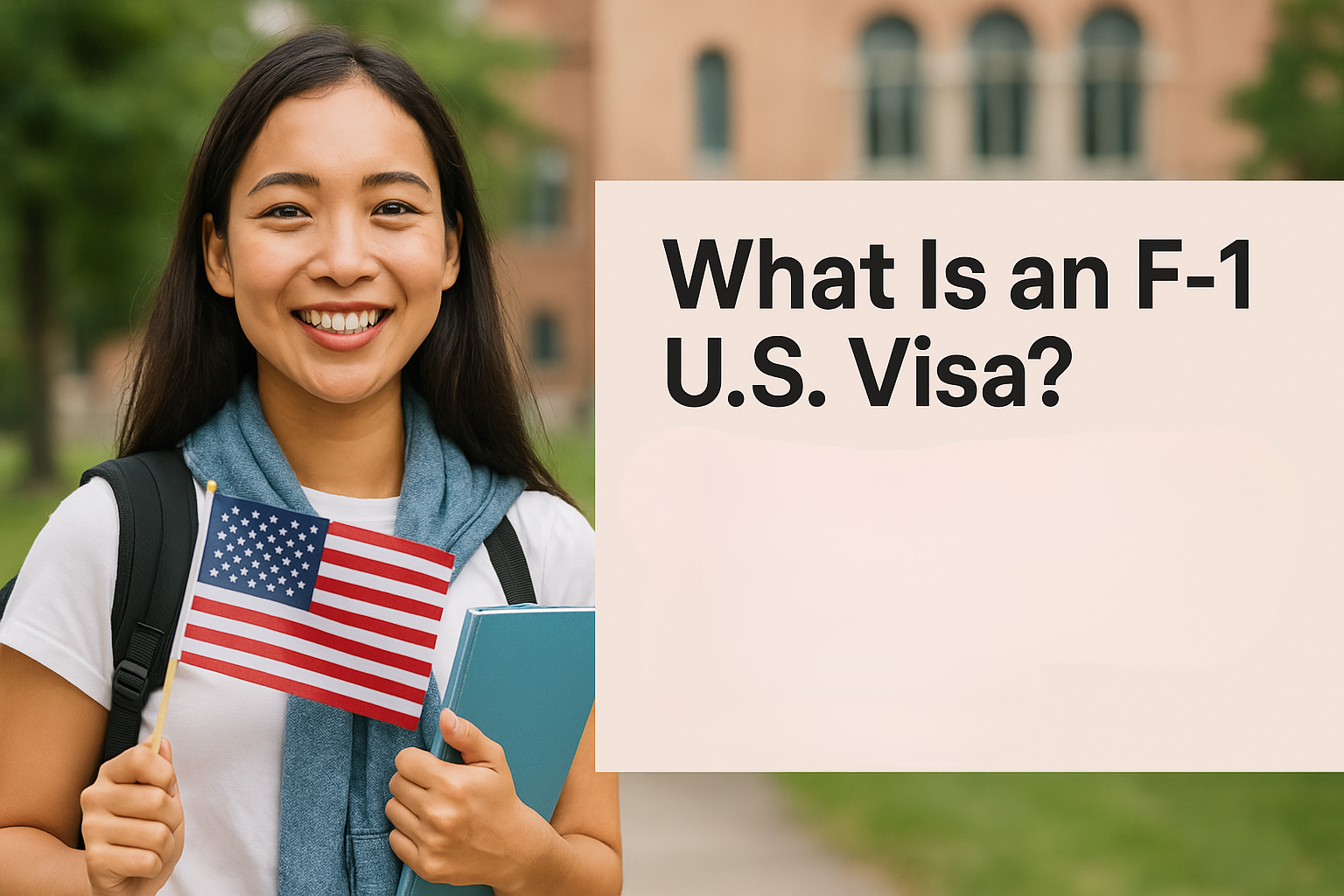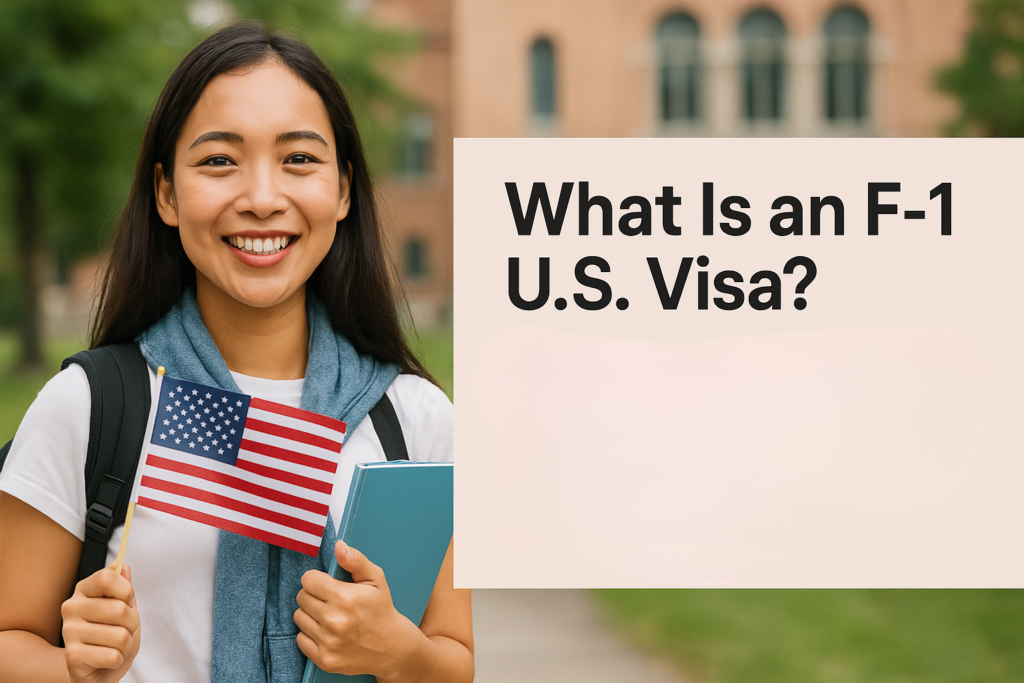
Understanding the F-1 Student Visa
For international students aiming to study in the United States, the What Is an F-1 U.S. Visa is the key to making that dream a reality. It’s a nonimmigrant visa designed specifically for full-time academic enrollment at accredited institutions across the country. More than just a student entry permit, it allows foreign nationals to stay in the U.S. while pursuing degrees, certificates, or language training, and even opens doors to employment opportunities under specific conditions. Compared to visitor or tourist visas, the F-1 offers extended benefits like the duration-of-status model and pathways to temporary work through CPT and OPT programs. For anyone starting an academic journey in the U.S., understanding this visa is an essential first step. What Is an F-1 U.S. Visa

Eligibility Requirements for the F-1 Visa
To qualify for an What Is an F-1 U.S. Visa, students must first secure admission to a SEVP-certified school, which will issue the vital Form I-20. With that in hand, applicants must demonstrate financial ability to cover tuition and living expenses for at least the first academic year. But eligibility doesn’t stop at financials. Applicants must also prove they have strong ties to their home country like property, family, or job commitments suggesting they plan to return after completing their studies. This visa is meant for serious students who are fully prepared to meet academic and immigration requirements.
Employment Opportunities for F-1 Students
While the What Is an F-1 U.S. Visa is primarily for education, it also comes with the potential for part-time employment. Students can work on campus up to 20 hours per week during the semester and full-time during breaks. Beyond campus, there are two key programs: Curricular Practical Training (CPT), which is tied to the coursework, and Optional Practical Training (OPT), which offers job experience after graduation up to 12 months, or 36 months for STEM students. These options help students gain practical, hands-on experience in their chosen fields while still in the U.S., making the visa a valuable tool for both academic and career growth.
Duration and Validity of Stay
Although the F-1 visa in your passport may have an expiration date, your actual stay is governed by the “Duration of Status” rule. This means you can remain in the U.S. for as long as you’re enrolled full-time in your academic program, plus a 60-day grace period after completing your studies. If you participate in OPT or a STEM extension, your legal stay extends accordingly. This flexible structure gives students enough time to finish their education and gain some work experience without immediately having to leave the country.
The F-1 Visa Application Process
Getting an F-1 visa starts with receiving a Form I-20 from a certified institution. After that, you must pay the SEVIS I-901 fee, fill out the DS-160 form, and schedule an interview at a U.S. embassy or consulate. During the interview, you’ll present financial documents, academic records, a valid passport, and visa fee receipts. U.S. consular officers will assess whether you meet the qualifications and truly intend to return to your home country after studying. The process can be detailed and time-sensitive, so preparation is key.
F-1 vs. J-1: What’s the Difference?
Choosing between an F-1 and a J-1 visa often depends on your academic goals and long-term plans. While both allow for study in the U.S., F-1 visas generally offer more freedom in terms of work opportunities and don’t come with the same home-country return requirement that some J-1 visas do. F-1 students typically deal directly with their school, while J-1 visa holders go through designated exchange programs. F-1 also tends to be more flexible with scholarships and funding sources, making it the more common choice for students pursuing full degree programs. What Is an F-1 U.S. Visa
From Student to Resident: Long-Term Pathways
For some students, studying in the U.S. is just the beginning. Many explore options for staying long-term, including transitioning from F-1 to H-1B work visas or applying for permanent residency. Pathways include employment-based green cards, EB-1 or EB-2 NIW categories for highly skilled professionals, or family-based options like marriage to a U.S. citizen. While it’s not guaranteed, and requires strategic planning and legal guidance, the F-1 can be the first step on a path toward permanent U.S. residency for those who want to stay and build a future here. What Is an F-1 U.S. Visa
Staying in Status: Rules You Must Follow
Maintaining your legal status as an F-1 student requires ongoing attention. You must stay enrolled full-time, report any address changes within 10 days, and keep all immigration documents current. Employment must be pre-approved and within allowed hours, and transferring schools or changing programs must go through the proper process. Violating these rules can result in the loss of your visa status, so staying informed and compliant is just as important as succeeding academically. What Is an F-1 U.S. Visa
Why the F-1 Visa Remains the Top Choice
The F-1 visa is more than just a permission slip to study it’s a gateway to world-class education, valuable work experience, and even long-term career options. It’s favored by students across the globe for its flexibility, clear structure, and the many opportunities it unlocks. While it requires serious planning and compliance, the rewards both academic and professional are well worth it. For international students with big goals, the F-1 remains the gold standard. What Is an F-1 U.S. Visa
Need Help With Your F-1 Visa Application? Choose Bibi Law for Expert Support
If you’re planning to study in the United States and wondering what is an F-1 U.S. visa and how to apply, having the right immigration legal team on your side is essential. At Bibi Law, we specialize in guiding international students through every step of the F-1 visa process from document preparation to interview readiness. What Is an F-1 U.S. Visa
With a strong track record of success, our legal experts ensure that your What Is an F-1 U.S. Visa application meets all U.S. immigration requirements, helping you avoid costly delays or rejections and start your academic journey with confidence.
📞 Call Us: +1 416-660-1598
📧 Email: almas@bibilaw.ca
🌐 Website: bibilaw.ca
Don’t leave your What Is an F-1 U.S. Visa application to chance. Contact Bibi Law today for professional, reliable support and take the first step toward achieving your American education goals.
